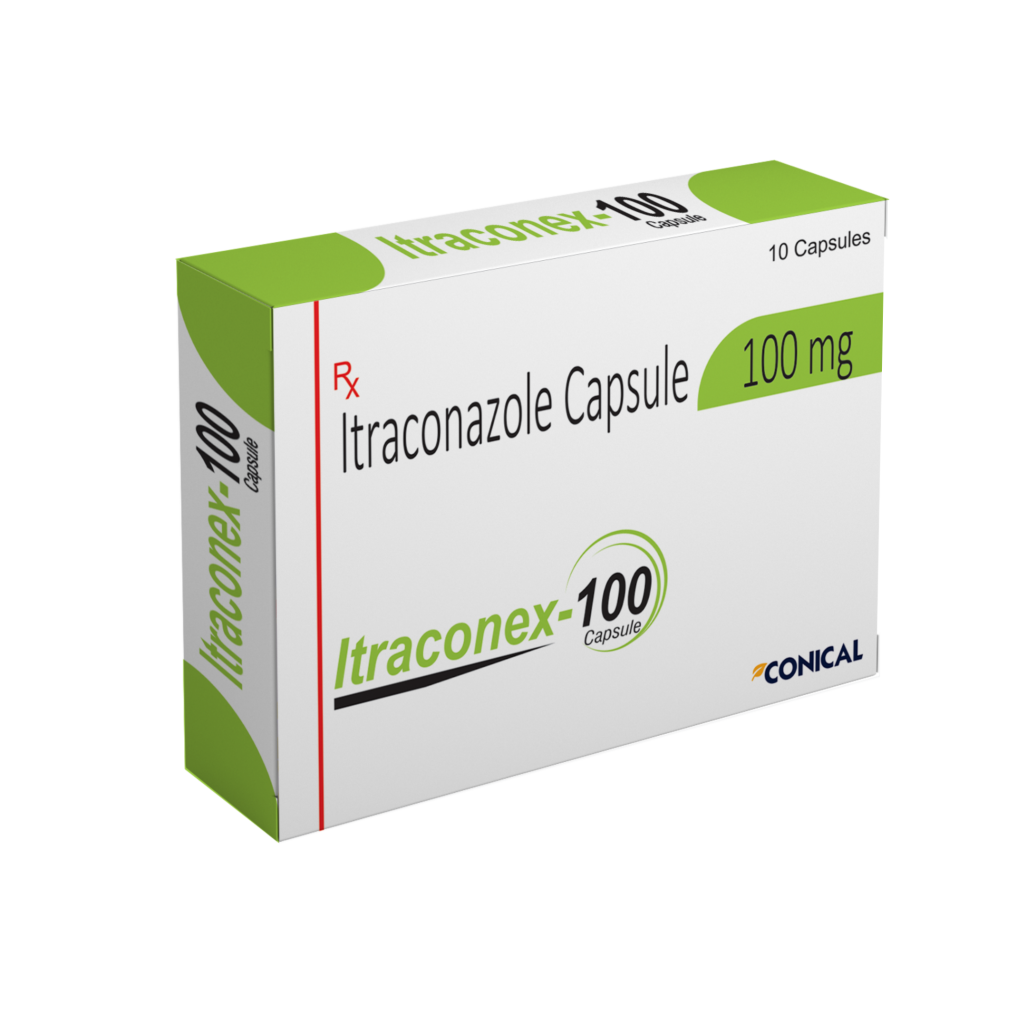







Itraconazole Capsule USP 100 mg is indicated for the treatment of the following fungal infections when thought likely to be susceptible:
Vulvovaginal candidiasis.
Pityriasis versicolor.
Dermatophytoses caused by organisms susceptible to itraconazole (Trichophyton spp. Microsporum spp. Epidermophyton floccosum) e.g. tinea pedis, tinea cruris, tinea corporis, tinea manuum.
Oral candidiasis.
Onychomycosis caused by dermatophytes and/or yeasts.
Cardiac effects
Itraconazole has been shown to have a negative inotropic effect and has been associated with reports of congestive heart failure. Heart failure was more frequently reported among spontaneous reports of 400 mg total daily dose than among those of lower total daily doses, suggesting that the risk of heart failure might increase with the total daily dose of itraconazole.
Calcium channel blockers can have negative inotropic effects which may be additive to those of itraconazole. In addition, itraconazole can inhibit the metabolisms of calcium channel blockers.
Hepatic effects
Very rare cases of serious hepatotoxicity, including some cases of fatal acute liver failure, have occurred with the use of itraconazole. Liver function monitoring should be considered in patients receiving itraconazole treatment. In patients with raised liver enzymes or active liver disease, or who have experienced liver toxicity with other drugs, treatment should not be started unless the expected benefit exceeds the risk of hepatic injury.
Hearing loss
Transient or permanent hearing loss has been reported in patients receiving treatment with itraconazole. Several of these reports included concurrent administration of quinidine which is contraindicated. The hearing loss usually resolves when treatment is stopped.
Immunocompromised patients
In some immunosuppressed patients (e.g. in neutropenia, AIDS or after organ transplantation), the oral bioavailability of itraconazole may be decreased.
Patients with immediately life-threatening systemic fungal infections
Due to the pharmacokinetic properties, itraconazole capsules are not recommended for initiation of treatment in patients with immediately life-threatening systemic fungal infections.
Patients with AIDS
In patients with AIDS having received treatment for a systemic fungal infection such as sporotrichosis, blastomycosis, histoplasmosis or cryptococcosis (meningeal and non-meningeal) and who are considered at risk for relapse.
Treatment schedules in adults for each indication are as follows:
Indication Dose
Vulvovaginal candidiasis 200 mg twice daily for 1 day
Pityriasis versicolor 200 mg once daily for 7 days
Tinea corporis, tinea cruris 100 mg once daily for 15 days
Tinea pedis, tinea manuum 100 mg once daily for 30 days
Oral candidiasis 100 mg once daily for 14 days
Onychomycosis 200 mg once daily for 3 months
For skin infections, optimal clinical and mycological effects are reached at 1 – 4 weeks after cessation of treatment and for nail infections at 6 – 9 months after the cessation of treatment. This is because elimination of itraconazole from skin and nails is slower than from plasma.
In Acquired Immune Deficiency Syndrome and neutropenic patients: for the treatment of oral candidiasis 200 mg once daily for 14 days is recommended due to the impaired absorption of itraconazole in these patient groups.
The length of treatment for systemic fungal infections should be dictated by the mycological and clinical response to therapy.
Undesirable effects listed below have been reported in clinical trials with itraconazole capsules and/or from spontaneous reports from post-marketing experience for all itraconazole formulations.
In clinical trials involving 2104 itraconazole-treated patients in the treatment of dermatomycoses or onychomycosis, the most frequently reported adverse experiences were of gastrointestinal, dermatological, and hepatic origin. Abdominal pain, nausea, Rash
Store below 30oC and protect from light.
Keep the medicine out of reach of children.
10 × 10 Alu/PVC Blister.
Itraconazole Capsule USP 100 mg are available in an Alu/PVC blister of 10 capsules. Such 10 blisters in a unit carton with pack insert.
Contact us directly to receive full information on the product, the formulation, the science behind it, stability data, and more. Our Business Development Manager is a click away.
Questions are useful tools, they open lines of communication; give us information; improve interactions, facilitate analysis, and many more.
A pharma CMO is a special kind of an organization, offering contract manufacturing services to pharmaceutical companies for various kinds of drug formulations.
Reduce overall costs and time to market :
Contract manufacturers already have the needed infrastructure and technical staff, so working with a CMO or CDMO can decrease the cost of manufacturing your pharmaceutical products.
Scalability and flexible production capacity :
You can produce what you need when you need it without worrying about excess capacity. Additionally, CMOs understand the importance of quality and compliance, so you don't have to sacrifice safety for scalability.
Save on upgrading and maintaining equipment :
If you have your manufacturing facility, you’ll have to pay to upgrade your equipment as technology advances—which can get expensive. A CMO/CDMO’s only function is to make and distribute products, so part of their core business responsibility is to update their equipment whenever needed and perform maintenance.
Ease supply chain issues :
During the pandemic, there were several instances of supply chain issues, including medicine shortages. CMOs are generally better equipped than startups to handle a supply chain crisis.
Bandwidth to focus on core competencies
When your company resources aren’t directly allocated to manufacturing and distribution, you have more time to focus on other tasks, like marketing your new drug, researching, or working on drug discovery.
We have 7+ manufacturing sites with a minimum of WHO GMP certification and other country-specific approvals like NAFDAC approved, PPK Kenya Approved, TFDA Tanzania Approved, EU-GMP Approved.
We have below manufacturing capacity:
For Tablet, Capsule, and soft gel: up to 1 million units per shift
For Syrup: up to 0.05 Million per shift
For Ampoule and Vial: up to 0.1 million units per shift
For Ointment and Cream: up to 0.1 million units per shift
For Suppository: 0.1 Million units per shift
